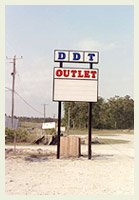
Image: Brooke Shelby Biggs
DDT is a nasty chemical with a nasty history. So supporting worldwide restrictions on the stuff would seem like a slam-dunk for a president seeking to rescuscitate his tarnished environmental image at home and abroad. Sure enough, George W. Bush recently pledged his support for a UN-sponsored treaty to restrict the production, trade, and use of the chemicals known as “persistent organic pollutants,” including DDT.
DDT, made infamous by Rachel Carson’s enduring classic “Silent Spring,” nearly wiped out several bird species, including the bald eagle, before it was banned in most of the industrialized world in the 1970s. Besides damaging the reproductive systems of fish-eating birds (the chemical lingers in the environment and becomes concentrated in the tissues of fish), studies suggest that it may cause breast cancer and birth defects in humans.
So why would anyone oppose restrictions on such a noxious substance? Because DDT also happens to be especially cheap, and especially good at killing mosquitoes and other carriers of malaria. Some scientists are making the case that DDT is the most effective and inexpensive tool in the battle against the disease — which kills an estimated one million people in developing countries each year — and anti-environmentalist pundits and politicians are enthusiastically jumping on the bandwagon. Secretary of State Colin Powell has said that the malaria pandemic creates a “dire humanitarian need” for DDT.
But what’s driving the pro-DDT lobby isn’t just heartfelt concern for human lives in Third World. Where was this conservative humanitarian zeal when world health agencies called on US drug companies to help battle the Third World’s other serious health scourge — AIDS? One pundit characterized those who demanded that pharmaceutical companies make AIDS drugs more widely available as “Communists” and “blockheads.”
Industry has an undeniable stake in the pesticide debate. According to the United Nations Children’s Fund, much of the upswing in malaria infections since DDT use was restricted can be traced to industrial practices, such as mining and large-scale irrigation. But curtailing those practices to help prevent malaria would hurt corporate profits in a way that spraying DDT won’t.
The logic behind the DDT boosters’ argument — that collateral environmental damage and long-term threats to human health are acceptable if malaria can be treated without interfering with business interests — is nasty, brutish, and short-sighted. (The subject of DDT seems to bring those traits out in people: A normally rational member of my family who works for the California Farm Bureau told me earlier this year that “DDT isn’t dangerous if you’re not a bird.”)
Missing from the debate is an honest assessment of how flawed a weapon DDT is: Proponents characterize it as a silver bullet, when in fact it is something closer to a fragmentation bomb. While directed household applications of DDT are highly effective in killing malarial bugs, there is nothing preventing the chemical’s escape into the surrounding environment, especially in rural areas. Malaria is not coincidentally common in tropical regions, home to some of the world’s key havens of biodiversity. If we are willing to risk entire species in the fight against disease, we should be certain that there are no other options.
Studies show that in many regions, “vector” insects such as mosquitos have already developed resistance to DDT. What’s more, alternatives such as synthetic pyrethroids have proven effective in mosquito-proofing homes in malaria regions. They too, however, have been linked to human health problems, so the need for safer alternatives remains.
But DDT fans play the disease card to divert attention from the true problems of a world where illness, poverty, and environmental degradation are profoundly intertwined. They call those who support less destructive solutions insensitive “eco-imperialists” and warn that greens are “putting the interests of the environment ahead of human lives.” Apparently, real humanitarians only put concern for corporate profits ahead of human lives.














